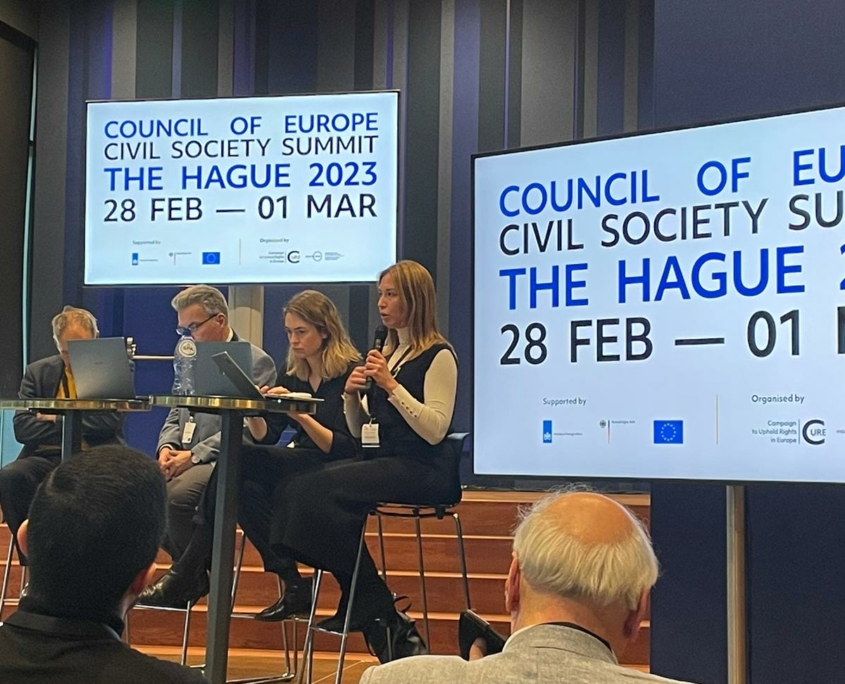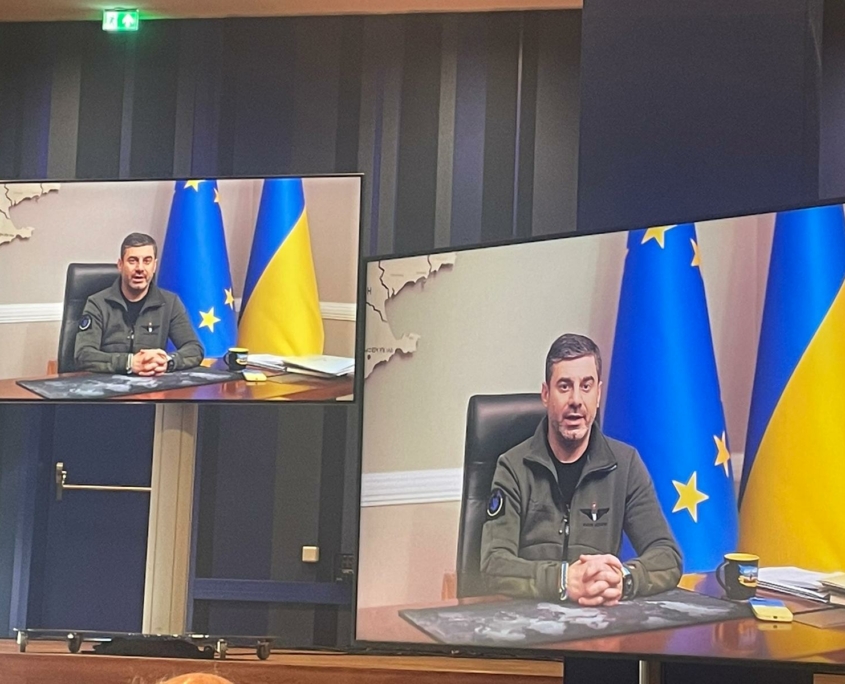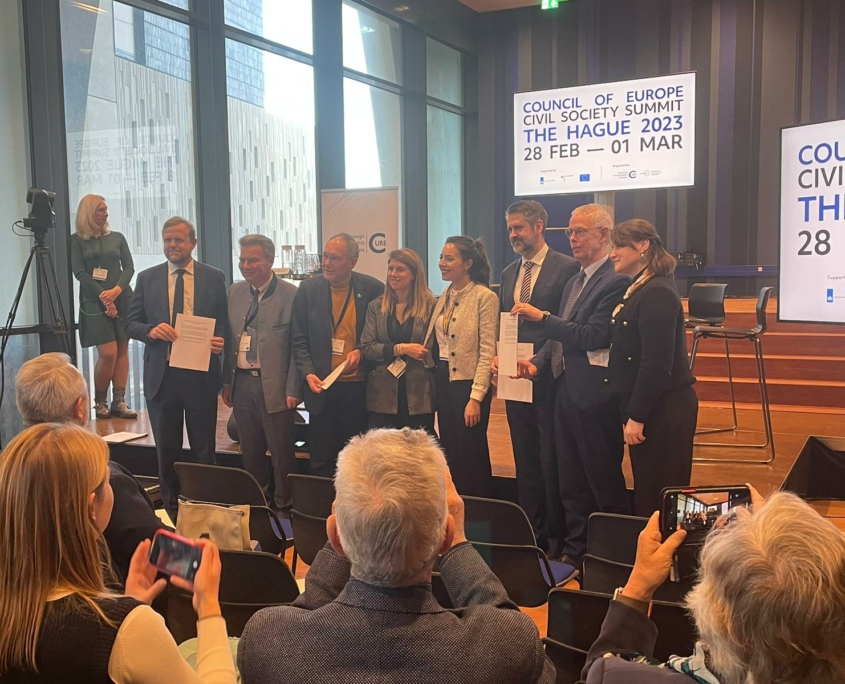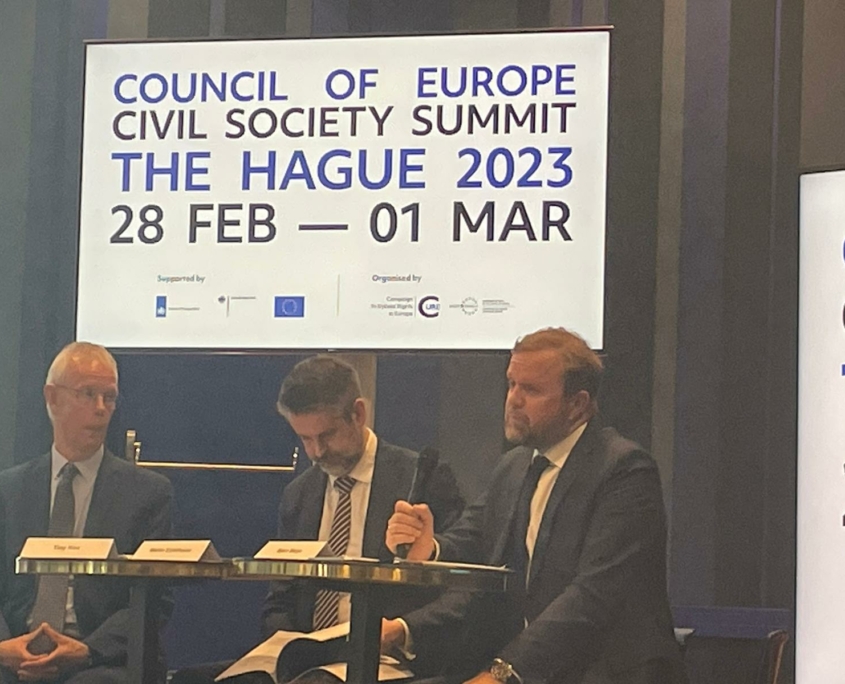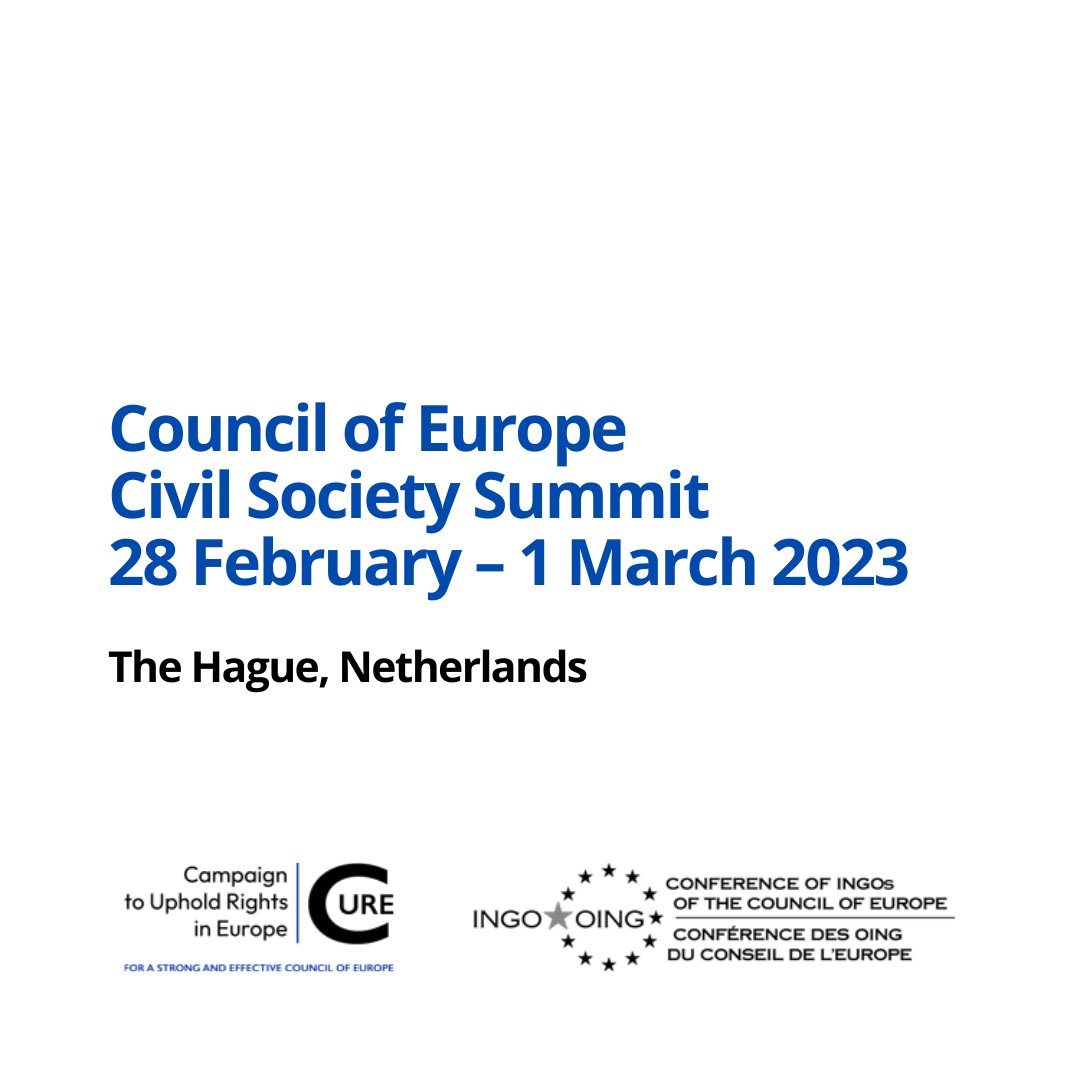Droga do Reykjaviku – spotkanie społeczeństwa obywatelskiego
1 marca 2023 r. wziąłem udział w spotkaniu organizacji społeczeństwa obywatelskiego (Civil Society Summit) w Hadze, które było poświęcone zbliżającemu się szczytowi głów państw Rady Europy w Reykjaviku. Szczyt zaplanowany jest na 16 i 17 maja 2023 r. Będzie miał kluczowe znaczenie dla przyszłości Rady Europy – kluczowej organizacji dla standardów demokratycznych, praworządności i praw człowieka w Europie.
Spotkanie miało na celu wypracowanie wspólnej deklaracji organizacji pozarządowych. Została ona przekazana przedstawicielom Rady Europy – Zastępcy Sekretarza Generalnego RE Bjornowi Borgowi oraz Przewodniczącemu Zgromadzenia Parlamentarnego Rady Europy (PACE). Mam nadzieję, że wpłynie ona na obrady Komitetu Stałego PACE, który odbywa się 2 i 3 marca 2023 r. w Hadze.
W moim wystąpieniu w czasie Civil Society Summit skupiłem się na podkreśleniu znaczenia momentu historycznego, w którym się znajdujemy (poniżej zapis mojego wystąpienia). W czasie dyskusji z przedstawicielami dyplomacji i Rady Europy zadałem pytanie, czy przewidziany jest udział w Szczycie w Reykjaviku Przewodniczącej Komisji Europejskiej Ursuli von der Leyen. Od tego zależy bowiem sukces idei przystąpienia Unii Europejskiej do Europejskiej Konwencji Praw Człowieka. Przedstawiciel dyplomacji Islandii poinformował, że Przewodnicząca von der Leyen potwierdziła swój udział w szczycie w Reykjaviku.
Spotkanie w Hadze to także okazja do rozmów z wieloma osobami zaangażowanymi w działania Rady Europy i Europejskiego Trybunału Praw Człowieka. Cieszę się, że mogłem wymienić się myślami z Yurim Dzhibladze i Harry Hummelem, którzy założyli CURE Network (Campaign to Uphold Rights in Europe), z Olgą Sadovskayą (z którą zasiadam w radzie OMCT), z Anną Błaszczak-Banasiak (szefowa Amnesty International Polska), Egbertem Myjerem (sędzia Europejskiego Trybunału Praw Człowieka w stanie spoczynku), z Georgem Stafford (dyrektor European Implementation Network), Karinną Moskalenko (legendarna pełnomocniczka skarżących z Rosji przed ETPCz) oraz z Eleną Crispi (FIDH). Dziękuję Sergeiowi Tereshenkov za pomoc w zorganizowaniu mojego pobytu.
Wystąpienie z Hagi:
Ladies and Gentlemen,
It is a great honour for me to be invited to the Civil Society Summit. I think that the timing of the event is really good, taking into account that the PACE Standing Committee meeting takes place next day in The Hague. There is now an unprecedented moment for the Council of Europe to make its internal reform. Using the theory by Bruce Ackermann – Russian aggression towards Ukraine has created a “constitutional moment” for the Council of Europe to move in the direction of powerful human rights and rule of law organization.
However, in order to achieve it, Reykjavik summit should not be just another high-level political meeting. First, heads of states should pay tribute to the Ukrainian nation that is defending freedom of the whole Europe, not just the Ukrainian independence. Being from Poland I feel it stronger than anyone else. Second, Ukrainian nation is fighting for the survival of European values, including democracy, human rights and rule of law. Therefore, European leaders should show that they also take a good care for them. That is why, the Reykjavik conclusions should be courageous and ambitious.
Reykjavik Summit should not concentrate just on different detailed institutional arrangements. Certainly, they should move things forward as regards development of the organization. But more important is political impetus. Unfortunately, there are certain concerns in this respect. United Kingdom leaders undermine from time-to-time value of the European Court of Human Rights jurisprudence and binding nature of Strasbourg interim measures. Such approach is just a gift for autocrats. They may refer to UK practices, and without any feeling of guilt, do the same – refuse to comply with orders and violate basic human rights. Therefore, old democracies’ leaders should take more into account what is the global consequence of some political statements. Second, in Poland the ECtHR jurisprudence is undermined by the Polish Constitutional Court, being politically subordinated institution, and by the Government of Poland itself. It is a pity that the country that once was the leader in cooperation with the Council of Europe, challenges the principles of multilateralism.
We should also point out to the role of the European Union. Time is ripe for the EU accession to the ECtHR. 45 times years have passed since first decisions of the European Commission on Human Rights rejecting possibility to control activities of the European Communities (CFDT case). In between we had number of cases decided by the ECtHR (e.g. Bosphorus Airways, Michaud), but still it is impossible for the ECtHR to control potential human rights abuses by the EU organs and institutions. Moreover, there is a provision in the Treaty on European Union calling for the EU accession to the ECtHR (Article 6.2 TEU). But it seems that due to competition and ambition of two courts (CJEU vs. ECtHR) the accession has never been made. This move might be symbolic, as it would bring more coherence to human rights’ standards in Europe. Moreover, the European Union could help in strengthening daily operation of the ECtHR and the Council of Europe, by providing necessary financial means.
It is obvious that Reykjavik Summit should address important issues concerning the war in Ukraine: accountability for war crimes committed by Russian military, register of damages and establishment of the special tribunal for the crime of aggression. It is good that this message appears in all reports preceding the Summit. But there is also a need for long-term plan how to bring back Belarus and Russia into the family of democratic states. The Council of Europe should develop road map of cooperation with civil society, media, human rights defenders and politicians in exile from those two countries.
The major tension is the democratic backsliding in some member states of the Council of Europe. The question is how this organization may stop this process and what kind of sanctions it may use. Once again, the cooperation with the European Union might be crucial here. Conditionality mechanism created by the EU could be important for states that are EU member states (such as Poland or Hungary), but also for those that are on their membership track. The Council of Europe bodies should simply deliver to the EU precise and well-researched reports and observations. But the Council of Europe should have strong instruments of reaction to any member states that violate core human rights and basic principles, such as systematic use of torture or political prisoners. Furthermore, one should develop different instruments of monitoring and peer pressure (such as the Venice Commission, GRECO, PACE political instruments, Commissioner for Human Rights). They are important in bringing the message of solidarity to those activists, journalists, judges etc., who are under political pressure. They are instruments of empowerment. But in order to fulfil their role, they should be used in a consequent, coordinated, precise and timely manner.
The last Council of Europe Summit was held in Warsaw in 2005. There were 23 heads of state and 14 prime ministers participating. It was a special moment for CEE countries, including Poland. There was a feeling of Fukuyama’s end of history –post-Soviet bloc was going to develop into one democratic direction. After 18 years we know that it is not true any longer. But our challenge is not just the current war in Ukraine. During those years, we allowed for the transformation of the Council of Europe into the organization that is mostly known by experts, NGOs and diplomats. People do not see big difference between Strasbourg and Luxembourg Court, between Parliamentary Assembly of the Council of Europe and the European Parliament. Therefore, we have to regain public understanding of what the Council of Europe is and what values it serves. Embeddedness of the Council of Europe in the society is important to put pressure on politicians and to pull compliance with Council of Europe’s standards and recommendations. Therefore, the Reykjavik Summit should address also the role of democratic education. Awareness raising on the the Council of Europe relevance should be strongly incorporated into school curricula.
2023 is important not only because of the Reykjavik Summit. On 19 April 2023 we will celebrate the 80th Anniversary of the Warsaw Ghetto Uprising. On 10 December 2023 we will have the 75th Anniversary of the Universal Declaration of Human Rights. First, we should remember about those who fought for values and sacrificed their lives. Second, human rights are now more relevant than ever. That is why we have to be determined and require it from our politicians.

